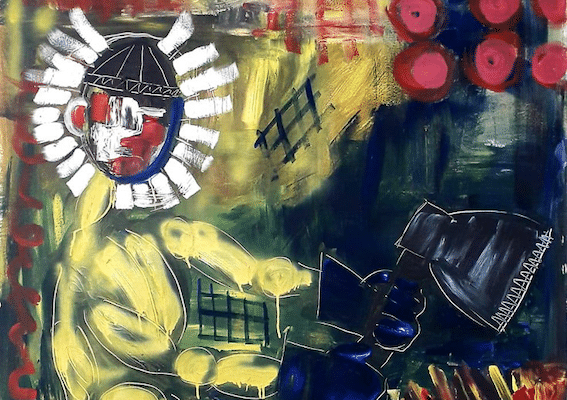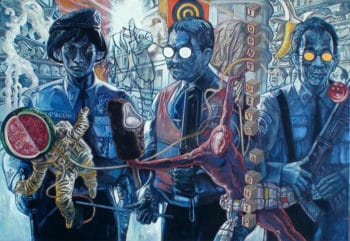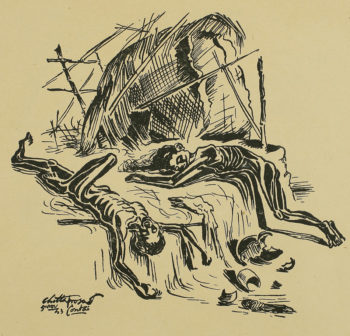Dear Friends,
Greetings from the desk of the Tricontinental: Institute for Social Research.
On 21 April, the head of the UN World Food Programme (WFP) David Beasley said that the world was experiencing a ‘hunger pandemic’. That day, the Global Network Against Food Crises and the Food Security Information Network released the 2020 Global Report on Food Crises. It suggested that 318 million people in 55 countries experience acute food insecurity and are on the cusp of acute hunger. This number is a gross underestimate: the actual number–before the global pandemic–would have been closer to 2.5 billion, if you measure hunger by caloric intake for intense activity.
The reasons for this hunger, they say, are armed conflict, extreme weather, and economic turbulence. More people could slip into the situation of acute food insecurity, the report says, as a result of a ‘shock or stressor, such as the COVID-19 pandemic’. Half of the world’s population fears going hungry as a result of the pandemic.
At Tricontinental: Institute for Social Research, we have been seized of the danger of this ‘hunger pandemic’. The newsletter below, drafted by our Senior Fellow P. Sainath (founder of the People’s Archive of Rural India), Richard Pithouse (the Coordinator of the South Africa office of Tricontinental: Institute for Social Research), and myself, focuses on the enormous weight of this ‘hunger pandemic’. At the end of the newsletter, we offer a ten-point agenda for this aspect of the Great Lockdown. We would like your thoughts on this list.
What the International Monetary Fund calls the Great Lockdown sent 2.7 billion people, according to the International Labour Organization, into either full unemployment or near unemployment, with many people one or two days away from desperate poverty and hunger. Starvation is already evident in many regions of the world. Social movements are doing what they can to organise horizontal forms of solidarity from below, but food riots are already a reality in India, South Africa, Honduras–everywhere, really. In many countries, states are responding with militarised forms of force, with bullets rather than bread.
Before the pandemic, in 2014, the United Nations’ Food and Agriculture Organization wrote: ‘Current food production and distribution systems are failing to feed the world’. That is a damning statement. It needs to be taken seriously. Half-hearted measures are not going to work. We need a social revolution in the world of food that breaks the grip of capital over the production and distribution of food.
Hunger is a bitter reality that modern civilisation should have expelled a century ago. What did it mean for human beings to learn how to build a car or fly a plane and not at the same time abolish the indignity of hunger?
The old English reverend Thomas Malthus was wrong when he wrote that, for eternity, food production would grow arithmetically (1-2-3-4) and that populations would grow geometrically (1-2-4-8), with the needs of the population easily outstripping the ability of humans to produce food. When Malthus wrote his treatise in 1789, there were about a billion people on the planet. There are now almost eight billion people, and yet scientists tell us that more than enough food is produced to be able to feed everyone. Nonetheless, there is hunger. Why?
Hunger stalks the planet because so many people are dispossessed. If you do not have access to land, in the countryside or in the city, you cannot produce your own food. If you have land but no access to seed and fertiliser, your capacities as a farmer are constrained. If you have no land and do not have money to buy food, you starve.
That’s the root problem. It is simply not addressed by the bourgeois order according to which money is god, land–rural and urban–is allocated through the market, and food is just another commodity from which capital seeks to profit. When modest food distribution programmes are implemented to stave off widespread famine, they often function as state subsidies for a food system captured, from the corporate farm to the supermarket, by capital.
Over the course of the past decades, the production of food has been enveloped into a global supply chain. Farmers cannot simply take their produce to market; they must sell it into a system that processes, transports, and then packages food for sale at a variety of retail outlets. Even this is not so simple, as the world of finance has enmeshed the farmer into speculation. In 2010, the United Nations’ former special rapporteur on the right to food, Olivier De Schutter, wrote about the way that hedge funds, pension funds, and investment banks overpowered agriculture with speculation through commodity derivatives. These financial houses, he wrote, were ‘generally unconcerned with agricultural market fundamentals’.
If there is any shock to the system, the entire chain collapses and farmers are often forced to burn or bury their food rather than allow it to be eaten. As Aime Williams writes in the Financial Times of the situation in the United States, these are ‘scenes out of the Great Depression: farmers destroying their products as Americans line up by the thousands outside food banks’.
If you listen to agricultural workers, farmers, and social movements around the world, you will find that they have lessons to teach us about how the system should be reorganised during this crisis. Here is a little bit of what we have learnt from them. It is a mix of emergency measures that can be immediately implemented and more long-term measures that can build towards sustained food security, and then food sovereignty – in other words, popular control over the food system.
- Enact emergency food distribution. Surplus stocks of food controlled by governments must be turned over to combat hunger. Governments must use their considerable resources to feed the people.
- Expropriate surpluses of food held by agribusiness, supermarkets, and speculators, and turn this over to the food distribution system.
- Feed the people. It is not enough to distribute groceries. Governments, alongside public action, must build chains of community kitchens where people can access food.
- Demand government support of farmers who face challenges to harvest their crops; governments must ensure that harvesting takes place following World Health Organization principles of safety.
- Demand living wages for agricultural workers, farmers, and others, regardless of whether they are able to work or not during the Great Lockdown. This must be sustained after the crisis. There is no sense in looking at workers as essential during an emergency and then disdaining their struggles for justice in a time of ‘normalcy’.
- Encourage financial support for farmers to grow food crops rather than turn to large-scale production of non-food cash crops. Millions of poor farmers in the poorer nations produce cash crops that the richer nations cannot grow in their climate zones; it is tough to grow pepper or coffee in Sweden. The World Bank ‘advised’ the poorer nations to focus on cash crops to earn dollars, but this has not helped any of the small farmers who do not grow enough to support their families. These farmers, like their communities and the rest of humanity, need food security.
- Reconsider the entanglement of the food supply chain, which injects enormous amounts of carbon into our food. Reconstruct food supply chains to be based on regions rather than on global distribution.
- Ban speculation of food by curbing derivatives and the futures market.
- Land–rural and urban–must be allocated outside of the logic of the market, and markets must be established to ensure that food can be produced and the surplus distributed outside of the control of corporate supermarkets. Communities should have direct control over the food system where they live.
- Build universal health systems, as called for by the Declaration of Alma-Ata in 1978. Strong public health systems are better equipped to constrain health emergencies. Such systems must have a strong rural component and must be open to all, including undocumented people.
The fact that so many people around the planet, including those living in the richest countries, were going hungry before this crisis is a profound indictment of the failures of capitalism. The fact that hunger is exploding exponentially during this crisis is a further indictment of capitalism. Hunger is among the most urgent of human needs, and immediate steps need to be taken to get food to people in this crisis. But it is also vital that the social value of land, rural and urban; the means to produce food, such as seeds and fertiliser; and food itself is affirmed and defended against the socially ruinous logic of commodification and profit.
In 1943, the British Empire’s bureaucrats took grain from Bengal and left the people in the grip of a terrible famine which killed between one and three million people. Sukanta Bhattacharya, a member of the Communist Party of India who was nineteen at that time, edited a poetry anthology called Akal (Famine) for the Anti-Fascist Writers’ and Artists’ Association. In this book, Bhattacharya published a poem called Hey Mahajibon [O Great Life!].
O great life! No more of this poetry.
Now bring the hard, harsh prose.
Dissolve the tender poetic chimes.
Strike the robust hammer of prose today.We do not need the tenderness of poetry.
Poetry, today you can rest.
A world devastated by hunger is prosaic.
The full moon looks like burnt bread.
Before I let you go, I would like to ask you to consider supporting our work at Tricontinental: Institute for Social Research. Go to our website and click on the link at the right of the site on the Donate button. Thank you.
Warmly, Vijay.






